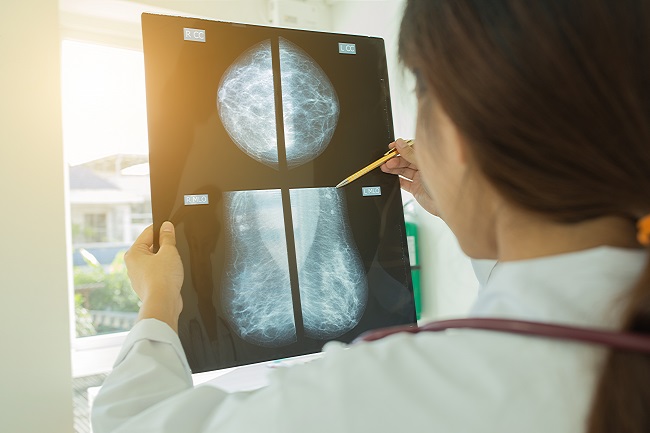New discovery could halt secondary breast cancer growth
Published: 28 July 2025
Scientists at the Cancer Research UK Scotland Institute, based at the University of Glasgow, have made a discovery which could help stop the spread of breast cancer – one of the leading causes of death from the disease.
Scientists at the Cancer Research UK Scotland Institute, based at the University of Glasgow, have made a discovery which could help stop the spread of breast cancer – one of the leading causes of death from the disease.
The research, published in the journal Embo Reports, found there are key metabolic changes which occur in the body before the cancer spreads, offering a vital window to intervene.
Detecting these changes early could allow therapies to stop cancer cells being able to move around the body and grow tumours elsewhere.

The study was conducted in the labs of Professor Jim Norman and Professor Karen Blyth at the Cancer Research UK Scotland Institute and the University of Glasgow.
Study lead Dr Cassie Clarke, of the Cancer Research UK Scotland Institute and University of Glasgow, said: “This study represents a major shift in how we think about preventing the spread of breast cancer.
“By targeting these metabolic changes as early as possible we could stop the cancer progressing and save lives.”
With around 56,800 people diagnosed with breast cancer in United Kingdom each year and around 11,300 people sadly losing their lives to the disease each year, finding new ways to tackle it is vital.
Thanks to research, breast cancer has become a far more treatable disease, but once it spreads to other areas within the body it becomes harder to control effectively.
Understanding how and why breast cancer spreads is key to preventing the disease becoming unmanageable with current therapies.
Cancer Research UK’s Director of Research, Dr Catherine Elliott, said: “Discoveries in cancer research have made huge strides in making breast cancer a far more treatable disease than ever before.
“However, metastasis - when cancer spreads - is a major factor in breast cancer becoming harder to treat especially if the cancer returns months or even many years later.
“This discovery gives us new hope for detecting and stopping metastasis early and ensuring people have many more years with their families and loved ones.”
This new study focused on how breast cancer changes the immune system so it can’t tackle cancer cells as they begin their spread.
The researchers found that cancer changes the metabolism (the way cells make and use energy) of specific immune cells, resulting in them releasing a prominent metabolite called uracil.
Uracil is a molecule key to essential processes in the body which was found to help distant organs build a “scaffold” to grow secondary tumours elsewhere in the body.
By blocking an enzyme called uridine phosphorylase-1 (UPP1), which produces uracil, the scientists were able to stop this scaffold forming in mice and restore the ability of the immune system to kill secondary cancer cells to prevent metastasis.
This opens the door to new potentially powerful new tools to tackle cancer - detecting uracil in the blood could help spot early signs of cancer spread then blocking UPP1 with drugs could stop the spread before it starts.
The research was funded by Cancer Research UK, the Wellcome Trust, the Medical Research Council, Breast Cancer Now and Pancreatic Cancer UK.
Simon Vincent, chief scientific officer at Breast Cancer Now, said: “This is an exciting piece of joint research that expands our understanding of how secondary breast cancer develops.
“The researchers discovered that high levels of a protein called UPP1 may make some cancers, including breast cancer, more likely to spread to other parts of the body, where the disease becomes incurable.
“In mice, targeting the UPP1 protein before secondary breast cancer developed led to fewer secondary breast tumours and a boosted immune response in the lungs.
“Now we need more research to see if this new insight can be turned into new drugs that stop secondary breast cancer, and potentially other secondary cancers, in their tracks. With around 61,000 people living with secondary breast cancer in the UK, research like this is vital.”
The team are now further investigating exactly how UPP1 changes the behaviour of immune cells, exploring the role of immune cell metabolism in early breast cancer initiation, and testing the ability of drugs that block immune cell metabolism to prevent cancer occurring.
The paper, “Uridine phosphorylase-1 supports metastasis by altering immune and extracellular matrix landscapes,” is published in EMBO.
Enquiries: ali.howard@glasgow.ac.uk or elizabeth.mcmeekin@glasgow.ac.uk
First published: 28 July 2025
<< July

